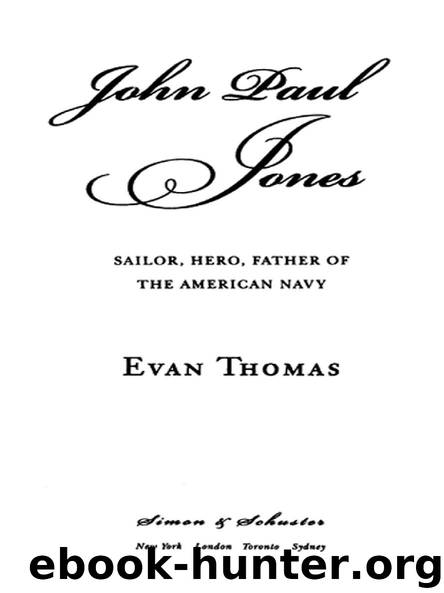John Paul Jones by 9781451603996

Author:9781451603996
Language: eng
Format: epub
Publisher: Simon & Schuster
Published: 2003-07-15T00:00:00+00:00
CHAPTER TEN
“No Sooner Seen Than Lost”
JONES HAD NO TIME to brood. At least eight Royal Navy warships, dispatched by a frantic Admiralty, were converging on Flamborough Head. The sea and wind were rising, the sky lowering. Jones and his squadron slipped over the horizen as the first of the British cruisers arrived on the scene. They split up and searched for Jones to the northeast, toward Scandinavia, to the southeast, toward Holland and France, and all around the British Isles. They never found him. Jones zigzagged in the North Sea for ten days and finally made a dash for the Texel island, the deep-water anchorage off Amsterdam, and the safety of a neutral port.
Jones’s legend was made. “Paul Jones resembles a Jack o’ Lantern, to mislead our mariners and terrify our coasts,” wrote the London Morning Post. “He is no sooner seen than lost.” As the reports of the battle began to filter back to London, the British press responded with lurid stories and illustrations. In the confused aftermath of the battle, a half-dozen British sailors who been set free from the hold of the Bonhomme Richard had stolen a small boat and rowed ashore near Flamborough Head. They described the incident of Jones throwing his pistol at the Bonhomme Richard’ s carpenter, as the frightened man was trying to strike the American flag. The tale was quickly and colorfully embellished by the newspapers:
During the engagement, Paul Jones (who was dressed in a short jacket and long trousers with about twelve charged pistols slung in a belt around his middle and a cutlass in his hand) shot seven of his men for deserting from their quarters, and to his nephew, whom he thought a little dastardly, he said that damn his eyes he would not blow his brains out, but he would pepper his shins, and actually had the barbarity to shoot at the lad’s legs, who is a lieutenant in his ship.
It was important for the British establishment to depict Jones as a lowlife, a brigand who wore short jackets and trousers, not a gentleman in breeches and coat. The navy had been embarrassed and wanted to belittle its adversary. “Jones flings us all into consternation and terror, and will hinder Lady Carlisle’s sea bathing,” the Earl of Carlisle wrote, a little flippantly. A London paper sent a correspondent to Kirkbean to learn more about the devil’s incarnation; he reported back that Jones as a schoolboy had been a “blockhead” who lay in wait for his teacher and beat him almost to death. But the poems and ballads in the cheap penny chapbooks also made Jones out to be a Robin Hood figure, outfoxing the clumsy sheriff’s men.
The more abuse the press heaped on Jones—he was a “desperado,” “a good seaman but a bad man,” “a vile fellow,” “a daring pirate who has for some time past done so much mischief on the coast of Great Britain”—the greater the victory he could claim. His achievement was not simply to defeat a superior warship, but to spread fear all through Britain.
Download
This site does not store any files on its server. We only index and link to content provided by other sites. Please contact the content providers to delete copyright contents if any and email us, we'll remove relevant links or contents immediately.
| Africa | Americas |
| Arctic & Antarctica | Asia |
| Australia & Oceania | Europe |
| Middle East | Russia |
| United States | World |
| Ancient Civilizations | Military |
| Historical Study & Educational Resources |
Washington by Ron Chernow(818)
Patriot Pirates by Robert H. Patton(742)
James Madison: A Life Reconsidered by Lynne Cheney(729)
American Tempest by Harlow Giles Unger(713)
John Adams by David McCullough(683)
The Radicalism of the American Revolution by Gordon S. Wood(666)
George Washington's Secret Six by Brian Kilmeade(635)
Mary Ball Washington by Craig Shirley(631)
The Whites of Their Eyes by Jill Lepore(586)
Henry Knox: Visionary General of the American Revolution by Mark Puls(572)
The First Conspiracy: The Secret Plot to Kill George Washington by Brad Meltzer & Josh Mensch(557)
To Begin the World Over Again by Matthew Lockwood(556)
American Revolution For Dummies by Steve Wiegand(551)
A Wilderness So Immense by Jon Kukla(548)
The American Revolution: A History by Gordon S. Wood(545)
Poor Richard's Almanack by Benjamin Franklin(539)
Revolutionary Summer: The Birth of American Independence by Joseph J. Ellis(536)
Paine, Thomas - Complete Works of Thomas Paine by Paine Thomas(504)
The Federalist papers by Alexander Hamilton; James Madison; John Jay; Lawrence Goldman(503)
